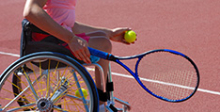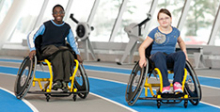Internal mini form
Contact Us Today
Golfer swings past physical challenges
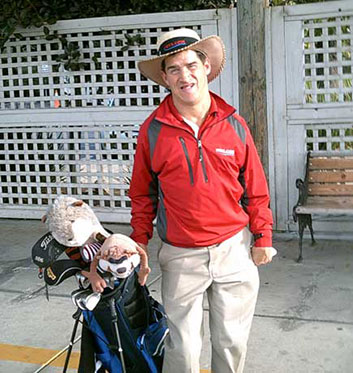
Golfer, Founder of Therapeutic Golf Foundation
Marty Turcios’ love of golf has led him not only to personal success on the green, but also prompted him to share his skills and expertise with others. Marty, 51, has Cerebral Palsy that affects his speech and mobility.
When Marty Turcios puts his golf clubs in his bag and heads to the course, the first thing he sees is an expanse of green hills; the ones he will spend his day taking on.
Marty, now 51, is an avid golfer and a person with Cerebral Palsy who walks the green without assistance and takes part in a game that for most takes concentration, precision, patience, and skill.
“The first time I saw my father playing golf I knew that I wanted to play,” said Marty, who lives in Martinez, a small town five minutes outside of San Francisco, Calif. “And I knew that it was something I could do on my own.”
Three years ago, Marty decided that he would use the independent spirit that propelled him from a child growing up with a condition many thought would put him a wheelchair into becoming a teacher, mentor, college graduate, and owner of his own foundation dedicated to the service of others, particularly those who are disabled. To meet that goal, he founded Marty Turcios’ Therapeutic Golf Foundation in Martinez, a Calif.
“I always think for myself. I meet a lot of people in and out of the disabled community who aren’t self-directed and self-determined; they spend a lot of time conforming to other people’s values. They’re always trying to meet somebody else’s expectations, and I won’t do that.”
– Marty Turcios
“Teaching a student how to GO golfing is more important than teaching a student how to golf. The object is to attract the student to choose responsible use of leisure time.”
– Marty Turcios
The Therapeutic Golf Foundation teaches children, men and women – many of whom have developmental or physical impairment – how to play and enjoy the game of golf in a way that works for them. Because no two individuals with Cerebral Palsy, or any other challenge, are identical, Marty teaches his clients how they can work past those limits – if it means holding the club in a certain way, taking on stances to provide stability, or if the client uses a wheelchair, how to golf from a sitting position.
“Golf is a very healthy sport,” Marty said. “It’ a safe game, and players get to spend a lot of time outdoors. It has a lot of therapeutic benefits.”
An early obsession
When Marty was growing up in California in the 1960s, children with physical challenges didn’t have the same kinds of opportunities for recreation and sport as they do today.
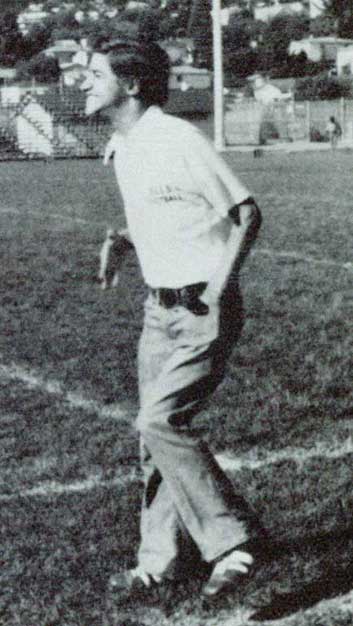
Marty can still remember when he saw his father and uncle golfing, and how it felt to try the club out for size.
“I loved it,” he said.
Knowing it was something he could do on his own, it wasn’t long before Marty and his brothers were sneaking onto the fairway of a local golf course, of which his parents – Robert and Barbara – were not members. “But as soon as my parents found out, they joined the club,” Marty said.
With support of his parents, Marty continued to perfect his technique on the green, and soon, he became a precise and formidable golfer.
“I worked at it, and soon, I was physically very good at it,” he said.
As Marty looks back on it, he believes that being young, whether one is disabled or not – is the best time to start a sports program.
“Golf is like other athletic pursuits in that it needs to be progressive,” he said. “The younger the individual is the more room they will progress at a positive rate. That was beneficial to me.”
Physical proficiency was soon followed by an improvement in Marty’s mental well-being.
“Golfing was a source of tremendous confidence for me,” he said.
His approach involves placing focus on controlling the golf ball, not his body, and in doing so he achieves improved balance, strength in all parts of the body, cardio vascular development, communication, relaxation and mental clarity.
Marty would eventually graduate from high school and attend Fresno State University, where he earned a bachelor’s degree in recreation. He went to work for a recreation center in San Francisco, but after eight years, decided he needed a change. So, he packed his golf clubs and moved south to San Jose. While there, at 35-years-old he earned a master’s degree in Recreational Therapy Administration from San Jose University.
He worked as a recreational therapist, and later helped create recreational golf programs – both for individuals with disability and others – throughout the United States. The programs included educational activities and demonstrations. In all, Marty has been a golf instructor for 20 years.
More recently, he has served as an assistant golf coach at an area high school, where he brings his knowledge of form and function to teens just learning the fundamentals of the game. But, he gave up that spot to focus on creating his foundation.
Building the Marty Turcios’ Therapeutic Golf Foundation
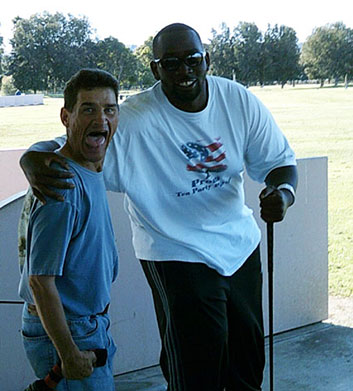
According to Marty, golf is a perfect environment for physically- and developmentally-challenged adults and children to develop a new pastime. It’s adaptable to a player’s various physical conditions, and it combats issues many individuals with impairment cope with daily, like fatigue, lethargy and substance abuse. Also, the game is not physically taxing so students can play throughout their lifetime.
“Teaching a student how to GO golfing is more important than teaching a student how to golf,” he said. “The object is to attract the student to choose responsible use of leisure time.” He believes strongly that golf is a healthy form of therapy that outlasts all other forms of traditional therapy; with it comes fresh air, manicured lawns and interesting landscapes which provide a sense of safety, well-being and a measure of competitive skill training.
To take his foundation from a dream to a reality, Marty held fundraising events, sought donations, applied for grants and approached merchants, corporations and individuals for support. The community responded in kind, and the foundation was up and running, said Marty.
Today, the Therapeutic Golf Foundation offers classes at a local golf club for individuals that are seven years old or older that have any combination of abilities. They place a special emphasis on recreational therapy assistance, physical therapy support, youth development, and emotional support. Some of Marty’s students are veterans with traumatic brain injuries, teens with autism, and adults with developmental disabilities.
To create greater awareness, Marty takes every opportunity he can to perform demonstrations and create educational opportunities at golf events around the country, including Professional Golf Association’s PGA TOUR educational programs and tours; Ladies Professional Golf Association’s LPGA TOUR Pro/Amateur fundraisers; and other golf related charity events.
Early on, Marty decided that his program would avoid some of the issues he noticed in other therapeutic recreation programs.
“Our program focuses on abilities, not disabilities,” he said. “Sometimes these programs teach people in a way that does not let people do it on their own, and I wanted to teach people how to play independently.”
Four decades after Marty took his first swing, he believes golf – and life – is about the big picture, not the small one, and that moment of clarity on the green with his father and uncle is what he would like others to experience.
He can’t point to one reason that he has been successful, other than the fact that being independent – in mind and body – is in his blood.
“I always think for myself,” he said. “I meet a lot of people in and out of the disabled community who aren’t self-directed and self-determined; they spend a lot of time conforming to other people’s values. They’re always trying to meet somebody else’s expectations, and I won’t do that.”
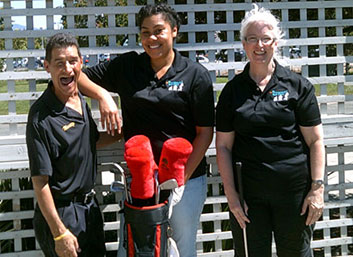
He said people who have disabilities can benefit exponentially by participating in athletics.
“People with abilities that are different than others can have a lot of experiences,” he said. “I always tell people who have physical challenges to go for it.”
For more information on Marty:
To learn more about Marty and the Marty Turcios’ Therapeutic Golf Foundation, visit Marty Turcios’ website or visit Marty Turcios’ Facebook.
To book Marty for an event, email [email protected]
To view videos of Marty, visit:

Athletes with Cerebral Palsy
Athletes are mythic figures that have used their bodies to achieve an enviable level of fitness. Although most people don’t associate individuals with Cerebral Palsy with sports and other acts of endurance, these athletes use their bodies to achieve feats of physicality that are only surpassed by personal satisfaction and confidence.
- Sam Broughton – Martial Arts
- Drew Dees – Shot Put
- James “Rooster” Gallion – Parkour
- Dick and Rick Hoyt – Triathletes
- Benjamin Jackson – High School Sports
- Cody and Cayden Long – Triathletes
- Linda Mastandrea – Paralympian
- Ryan McGraw – Yoga
- Kyle and Brent Pease – Triathletes
- John Quinn – Navy
- Jack Runser – Wrestler and Bodybuilder
- Jerry Traylor – Mountain Climber
- Marty Turcios – Golfer
- Ahkeel Whitehead – Paralympic Hopeful
- Duncan Wyeth – Paralympian



